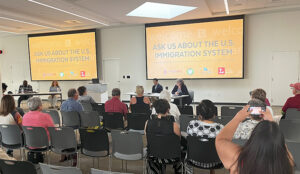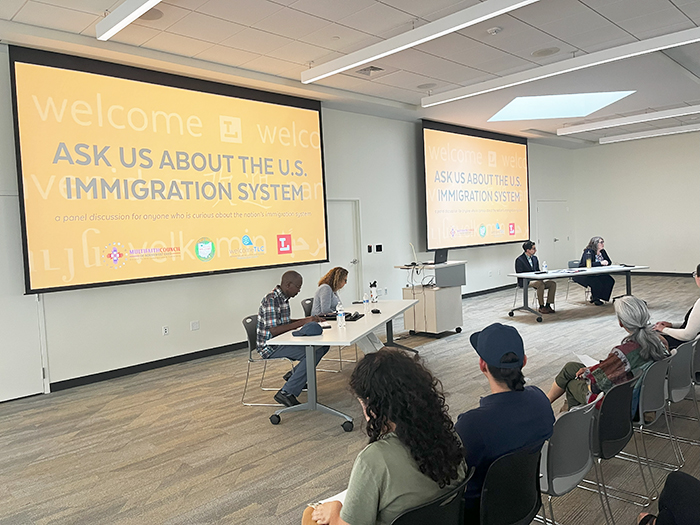
 By Jefferson Diaz
By Jefferson Diaz
The Truth Reporter
The “Ask Us about the U.S. Immigration System” forum was held to a packed house on Tuesday, June 17, in meeting room 1 of the Toledo Library’s Main Branch.
Speakers: Eugenio Mollo Jr., clinical assistant professor of Law and Director of the Immigrant Justice Clinic at the University of Toledo College of Law; A.S. Kefa Otiso, PhD, professor of Geography at Bowling Green State University and founding member of the New African Immigrant Commission of Ohio; Mechelle Zarou, chief People and Culture Officer and deputy general counsel at the Sisters of St. John the Baptist Church. The speakers devoted themselves for just over two hours to giving a current X-ray of our country’s immigration system.
“Improving our immigration system, to provide visas and other legal documents to migrants, requires more political will than a very complicated solution,” said Mollo, who reported that a full immigration reform has not been implemented in the United States since 1986.
“Our system has been broken for a long time. What’s worrying right now is that due process isn’t being respected,” added Mollo, who also provided details on how long it can take for a migrant in the U.S. to obtain a green card or citizenship.
For example, approval times for a green card can take up to two years, although once obtained, the wait time is retroactive to the U.S. Citizenship and Immigration Services for obtaining citizenship. Refugees have a shorter wait time for a green card, just over a year.
Mechelle Zarou highlighted the economic value that migrants have for Toledo and showed some figures in this regard: six percent of migrants in the city have some kind of entrepreneur activity, which is above the national average; in 2017 – these are the most recent figures available – they contributed $1.4 billion to Lucas County’s GDP; and 35 percent of migrants in Toledo have a bachelor’s degree, compared to 17.9 percent of those born and raised in Toledo.
Otiso emphasized the importance of international university students to the academic and intellectual development of the United States. “If we begin to implement a restrictive policy on international students obtaining student visas, countries like China and India will overtake us in the intellectual race. Currently, California and New York are the states with the most international students.”
The Q&A session was intense, with most questions focusing on what to do if a migrant is arrested by ICE and how to apply for asylum for citizens who arrived in the United States under the CNHV (humanitarian parole) program, which was eliminated during this second Donald Trump administration.
The Toledo Library’s management pledged to hold more events of this kind soon due to the importance of the topic in these current times.

